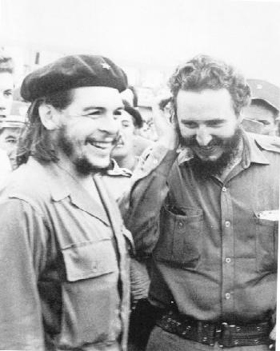CSPE Links
 Timor
Timor
 Cuba
Cuba
 Global Warming
Global Warming Africa I
Africa I  Argentina
Argentina  The Courts
The Courts  US Presidency
US Presidency  ASTI Strike
ASTI Strike  Attack
on America
Attack
on America
When Castro came to power he made sweeping economic and social changes. He allied his government with the Soviet Union whose leader was Krushchev. He seized and nationalised billions of dollars of American property.

 Photo: Che Guevara (left) with Fidel Castro
Photo: Che Guevara (left) with Fidel CastroThe island nation of Cuba, located just ninety miles off the coast of Florida, is home to 11 million people and has one of the few remaining communist regimes in the world. Cuba's leader, Fidel Castro, came to power in 1959 after a revolution in which Batista was overthrown. This was a popular rising amongst most of the population who lived in poverty while a minority of Cubans lived extravagant lifestyles. During the first half of this century, Cuba resembled a U.S. colony with many wealthy Americans holidaying on the island. During prohibition, when alcohol was banned in America, many Americans partied in Cuba. And all this took place when most Cubans lived in poverty.
When Castro came to power he made sweeping economic and social changes. He allied his government with the Soviet Union whose leader was Krushchev. He seized and nationalised billions of dollars of American property.
Ever since this, U.S. relations with Cuba have been strained. A trade embargo against Cuba was imposed in 1960 and is still in place today. The trade embargo was enacted by the American President, Dwight Eisenhower. The reason for the embargo was three-fold: to retaliate for seizing American property, for human rights abuses in Cuba and for the close ties Cuba had with the Soviet Union.
President John F. Kennedy succeeded Eisenhower in 1961. Eisenhower had been planning an invasion of Cuba by Cuban exiles. Against his better judgement, Kennedy put the invasion into action. It was known as the Bay of Pigs and ended in complete disaster for America. The exiles were heavily defeated.
In 1962, U.S. leaders learned that the Soviet Union was installing nuclear missiles in Cuba. In a tense stand-off, known as the Cuban Missile crisis, Kennedy placed U.S. military forces on alert and blockaded the island until the Soviets agreed to abandon their installation.
In the decades since the Soviet Union were Cuba's main trading partners providing the Cuban economy with over $6 billion dollars a year. When the Soviet Union broke up in 1991 this aid ended making the economy very weak. The Americans tightened the screw on their embargo with further measures hoping that economic ruin would eventually cause Fidel Castro to be overthrown. However, this has not happened. Castro has brought in his own reforms which have helped the economy in recent years.
World opinion is divided on the Cuban question. There are many who admire the socialist system in Cuba where all receive free education and health care. On the other hand there have been many human rights abuses documented by Amnesty over the years and thousands of Cubans have fled the island. There is a thriving Cuban community based in Florida who would love to see their island free from Castro and who support the American embargo. They wish to return some day to a free Cuba.
A little six year-old Cuban boy called Elian Gonzalez has become the centre of attention of the world's media. Elian tried to escape from Cuba with his mother. Tragically his mother drowned in the treacherous crossing but Elian was rescued. A debate is raging as to whether Elian should be returned to relatives in Cuba or remain with relatives in Florida. It appears that all the difficulties between America and Cuba over the years are now being lived through a little boy.


Castro

Guevara

Elian